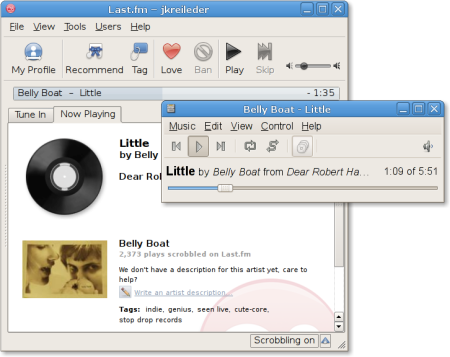I have updated my new style last.fm plug-in for Rhythmbox. The biggest change is that the last.fm client now gets started automatically. See the original article for more information and code!
Just like a lot of other Rhythmbox users I like to scrobble my played tracks to last.fm. Unfortunately Rhythmbox provides no way to love a track. The last.fm plug-ins for Windows and OS X have been modified to scrobble through the last.fm client some time ago but the Rhythmbox plug-in still submits directly. That is until now…

I have written a new last.fm plug-in for Rhythmbox today. Instead of scrobbling directly like the old one, it submits tracks via the lastfm client application. The client displays additional information about the currently playing song and you can love and tag the song with it.
The source code is available as a patch against Rhythmbox 2.90.1 (git snapshot 20120108): scrobbler-v3t.patch
You can apply this patch with:
patch -NEp1 < ~/scrobbler-v3t.patch
Ubuntu Oneiric Ocelot users can get precompiled packages from my APT repositories by running these commands in a terminal:
$ sudo add-apt-repository \
'/static/debian/rhythmbox/ main'
$ wget /static/gpg.asc -O - | \
sudo apt-key add -
$ sudo apt-get update
$ sudo apt-get install rhythmbox rhythmbox-plugins lastfm
To enable the new plug-in go to Edit » Plugins. Disable the “Last.fm” plug-in and enable the “New Style Last.fm Scrobbler”.
If you enable this scrobbler plug-in, you have to disable the old Last.fm plug-in! Otherwise you will have two plug-ins which will both submit to last.fm at the same time. Only use one at a time!
Note that this first version of the plug-in does not start the lastfm client automatically! It will scrobble only if you start the client manually. I will fix this in the next version.
Feedback, postive as well as negative, is very welcome. If you want to report a bug, please include the output of “rhythmbox -D rb-scrobbler-plugin” and the tags of the song you wanted to scrobble.
If you want to report a crash, providing a gdb backtrace would be nice.
You might also want to take a look at this thread on the last.fm development forum.
May 20th, 2007: v2 of the plug-in is available now. lastfm gets launched automatically now.
May 22nd, 2007: v3 is available. The patch and the Ubuntu package have been updated: Changes since v2
May 25th, 2007: v3a: Updated patch and deb for the new Ubuntu Gutsy version of Rhythmbox.
May 29th, 2007: v3b: Updated patch and deb for the new Rhythmbox release.
May 31st, 2007: Updated patch Ubuntu package.
June 1st, 2007: Added APT repositories for Ubuntu Feisty and Gutsy.
June 28th, 2007: v3c: Updated patch and debs for the new Rhythmbox release.
August 16th, 2007: v3d: Updated patch and debs for Rhythmbox 0.11.2.
November 14th, 2007: v3e: Updated patch and debs for Rhythmbox 0.11.3. Add Hardy repository.
November 30th, 2007:Updated gusty and hardy builds. Include fixed Croatian po file from Franko Burolo.
February 7th, 2008: v3f: Updated patch and debs for Rhythmbox 0.11.4. (Thanks to Iain Buchanan for notifying me of the missing patch!)
May 31st, 2008: v3g: Updated patch to apply cleanly to Rhythmbox 0.11.5. (The debs for hardy have been at 0.11.5 for quite a while).
October 15st, 2008: v3h: Updated patch to apply cleanly to Rhythmbox 0.11.6. Ubuntu packages are available for i386, amd64, and lpia now.
October 20st, 2008: v3i: Updated patch to apply cleanly to the real Rhythmbox 0.11.6 release. v3h was for a later version from SVN.
April 24th, 2009: v3j: Update patch to apply cleanly to Rhythmbox 0.12.0. Provide debs for Ubuntu Jaunty.
November 4th, 2009: v3k: Update patch to apply cleanly to Rhythmbox 0.12.5 and provide debs for Ubuntu Karmic.
November 29th, 2009: v3l: Update patch to apply cleanly to Rhythmbox 0.12.6 and provide debs for Ubuntu Lucid too.
April 25th, 2010: v3m: Update patch to apply cleanly to Rhythmbox 0.12.8. Provide debs for Ubuntu Lucid.
Jun 3rd, 2010: v3n: Update patch to apply cleanly to Rhythmbox 0.12.8git20100602. Provide debs for Ubuntu Maverick Meerkat 10.10.
Jun 13th, 2010: v3o: Update patch to apply cleanly to Rhythmbox 0.12.8git20100611. Updated debs for Ubuntu Maverick Meerkat 10.10.
October 10th, 2010: v3p: Update patch to apply cleanly to Rhythmbox 0.13.1. Provide updated debs for Ubuntu Maverick Meerkat 10.10.
April 4th, 2011: v3p: Update patch to apply cleanly to Rhythmbox 0.13.3. Provide debs for Ubuntu Natty Narwhal 11.04.
October 16th, 2011: v3r: Updated patch for new plug-in infrastructure in Rhythmbox 2.90.1. Provide debs for Ubuntu Oneiric Ocelot 11.10.
December 23rd, 2011: v3s: Updated patch. Provide debs for Ubuntu Precise Pangolin 12.04.
January 14th, 2012: v3t: Update patch and debs for Ubuntu Precise.
As pointed out on the WordPress development blog, a cracker gained access to the wordpress.org servers and replaced the 2.1.1 download with a modified exploitable version. The exploitable download may have been on the site for three or four days!
It may be a good idea for the WordPress developers to sign their releases with a well known and trusted PGP key. This would allow people to verify that downloaded files are really what they should be!
This is a well-established practice used by other projects, for example by the Linux kernel.
The recently released security update for WordPress introduced some changes that broke my HTTPS patch for it. I have updated the patch for WordPress 2.0.6 and 2.0.7-RC1 now: wp2-ssl.patch.
Read the complete SSL setup guide here: Securing WordPress 2 Admin Access With SSL
Regarding WordPress security, please note that there still is a possible exploit for 2.0.6: New WordPress exploit also affects version 2.0.6
Make sure you use safe a PHP version and set register_globals = off.
I’ve posted a recipe for chrooting MySQL on Debian sarge a while ago. These instructions no longer work out of the box for newer MySQL packages from Debian and Ubuntu. The main problem is that the startup script added a few extra checks and script invocations that don’t understand the chroot environment. So here’s an updated plan:
- Prepare the chroot directory. It’s recommended to use an extra partition/filesystem for it. I will use
/srv/mysql(which is an LVM2 partition with an ext3 filesystem on my system) for the rest of the text. - Stop MySQL:
/etc/init.d/mysql stop
- Copy the databases to new location:
mkdir -p /srv/mysql/var/lib cp -a /var/lib/mysql /srv/mysql/var/lib
- Copy this script to
/etc/default/mysql-chroot - Edit
/etc/init.d/mysql:- Source the
mysql-chrootscript somewhere at the top:… test -x /usr/sbin/mysqld || exit 0 . /etc/default/mysql-chroot SELF=$(cd $(dirname $0); pwd -P)/$(basename $0) …
- Fix the disk space check:
… # check for diskspace shortage datadir=`mysqld_get_param datadir` if LC_ALL=C BLOCKSIZE= df --portability $CHROOT_DIR$datadir/. | tail -n 1 | awk '{ exit ($4>4096) }'; then log_failure_msg "$0: ERROR: The partition with $datadir is too full!" … - Run
setup_chrootright in the start section:… if mysqld_status check_alive nowarn; then echo "...already running." else setup_chroot /usr/bin/mysqld_safe > /dev/null 2>&1 & …
- Somehow
/var/run/mysqld/mysqld.piddisappears after each start. We have to create it each time, otherwise thestopcommand won’t work properly:… if mysqld_status check_alive warn; then log_end_msg 0 ln -sf $CHROOT_DIR/var/run/mysqld/mysqld.pid \ /var/run/mysqld # Now start mysqlcheck or whatever the admin wants. output=$(/etc/mysql/debian-start) …
- Source the
- In
/etc/mysql/debian.cnf, change the twosocketlines to:socket = /srv/mysql/var/run/mysqld/mysqld.sock
- In
/etc/mysql/my.cnf:- Change the
socketline in the[client]section to:socket = /srv/mysql/var/run/mysqld/mysqld.sock
Don’t change the
socketlines in the other sections! - Add
chroot = /srv/mysql
to the
[mysqld]section.
- Change the
- Prepend
/srv/mysqlto the log files listed in/etc/logrotate.d/mysql-server - Make
/usr/bin/mysql_upgrade_shelluse the chrooted socket. Note: Currently these changes must be made each time mysql gets upgraded because upgrades override this file!… --password=*) password=`echo "$arg" | sed -e 's/^[^=]*=//'` ;; --socket=*) socket=`echo "$arg" | sed -e 's/^[^=]*=//'` ;; --ldata=*|--data=*|--datadir=*) DATADIR=`echo "$arg" | sed -e 's/^[^=]*=//'` ;; … fi $bindir/mysql_fix_privilege_tables --silent --user=$user --password=$password --socket=$socket $args exit 0 … check_args="--check-upgrade --all-databases --auto-repair --user=$user --password=$password --socket=$socket" … $bindir/mysql_fix_privilege_tables --silent --user=$user --password=$password --socket=$socket $args …
- Start MySQL:
/etc/init.d/mysql start
- Check
/var/log/syslogfor errors ;-)
